Climate & Environment
 CU Boulder researchers from across campus have pivoted to study the aftermath of the Marshall Fire, hoping to learn from a tragedy in their own backyard and help prepare the country for the next “climate fire.”
CU Boulder researchers from across campus have pivoted to study the aftermath of the Marshall Fire, hoping to learn from a tragedy in their own backyard and help prepare the country for the next “climate fire.”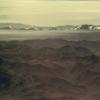 A new CU Boulder study shows iodine from desert dust can decrease air pollution, but it could prolong greenhouse gas lifetimes.
A new CU Boulder study shows iodine from desert dust can decrease air pollution, but it could prolong greenhouse gas lifetimes. Recent data reveal U.S. news coverage of climate change reached an all-time high in October and November. The language is also changing, with more intense words and phrases being used in the news to describe the phenomenon, such as “climate catastrophe” and “climate emergency.”
Recent data reveal U.S. news coverage of climate change reached an all-time high in October and November. The language is also changing, with more intense words and phrases being used in the news to describe the phenomenon, such as “climate catastrophe” and “climate emergency.” Climate change is a much bigger problem than individuals can solve alone, but CU experts say we each can make a difference. If you want to make some climate-focused changes to improve the present and future of the planet, consider these resolutions in the new year.
Climate change is a much bigger problem than individuals can solve alone, but CU experts say we each can make a difference. If you want to make some climate-focused changes to improve the present and future of the planet, consider these resolutions in the new year.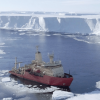 Antarctica’s Thwaites Glacier is retreating rapidly as a warming ocean slowly erases its ice from below, leading to faster flow, more fracturing and a threat of collapse. The glacier is the size of Florida or Britain and currently contributes four percent of annual global sea-level rise.
Antarctica’s Thwaites Glacier is retreating rapidly as a warming ocean slowly erases its ice from below, leading to faster flow, more fracturing and a threat of collapse. The glacier is the size of Florida or Britain and currently contributes four percent of annual global sea-level rise.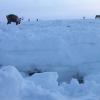 More rain than snow will fall in the Arctic, and this transition will occur decades earlier than previously predicted, a new study led by the University of Manitoba and co-authored by scientists at the National Snow and Ice Data Center at CU reports.
More rain than snow will fall in the Arctic, and this transition will occur decades earlier than previously predicted, a new study led by the University of Manitoba and co-authored by scientists at the National Snow and Ice Data Center at CU reports. Car tailpipes spew out molecules of ammonia, a harmful air pollutant that can lead to thousands of premature deaths every year. New research shows that vehicles may produce a lot more of these emissions than federal and state regulators have believed.
Car tailpipes spew out molecules of ammonia, a harmful air pollutant that can lead to thousands of premature deaths every year. New research shows that vehicles may produce a lot more of these emissions than federal and state regulators have believed.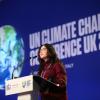 The 26th United Nations Climate Change Conference of the Parties recently came to an end, and participants came away with the Glasgow Climate Pact––a rulebook for complying with the 2015 Paris Agreement. Leaders must now follow through.
The 26th United Nations Climate Change Conference of the Parties recently came to an end, and participants came away with the Glasgow Climate Pact––a rulebook for complying with the 2015 Paris Agreement. Leaders must now follow through. A new study out of the Leeds School of Business shows that small businesses focused on climate-friendly goods and services may be more effective at addressing climate change because they can bridge the political divide by offering climate solutions.
A new study out of the Leeds School of Business shows that small businesses focused on climate-friendly goods and services may be more effective at addressing climate change because they can bridge the political divide by offering climate solutions.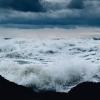 A new CIRES-led study shows that ocean temperatures, not ice sheets themselves, were directly responsible for the southward shift in West Coast precipitation patterns during the last Ice Age.
A new CIRES-led study shows that ocean temperatures, not ice sheets themselves, were directly responsible for the southward shift in West Coast precipitation patterns during the last Ice Age.


